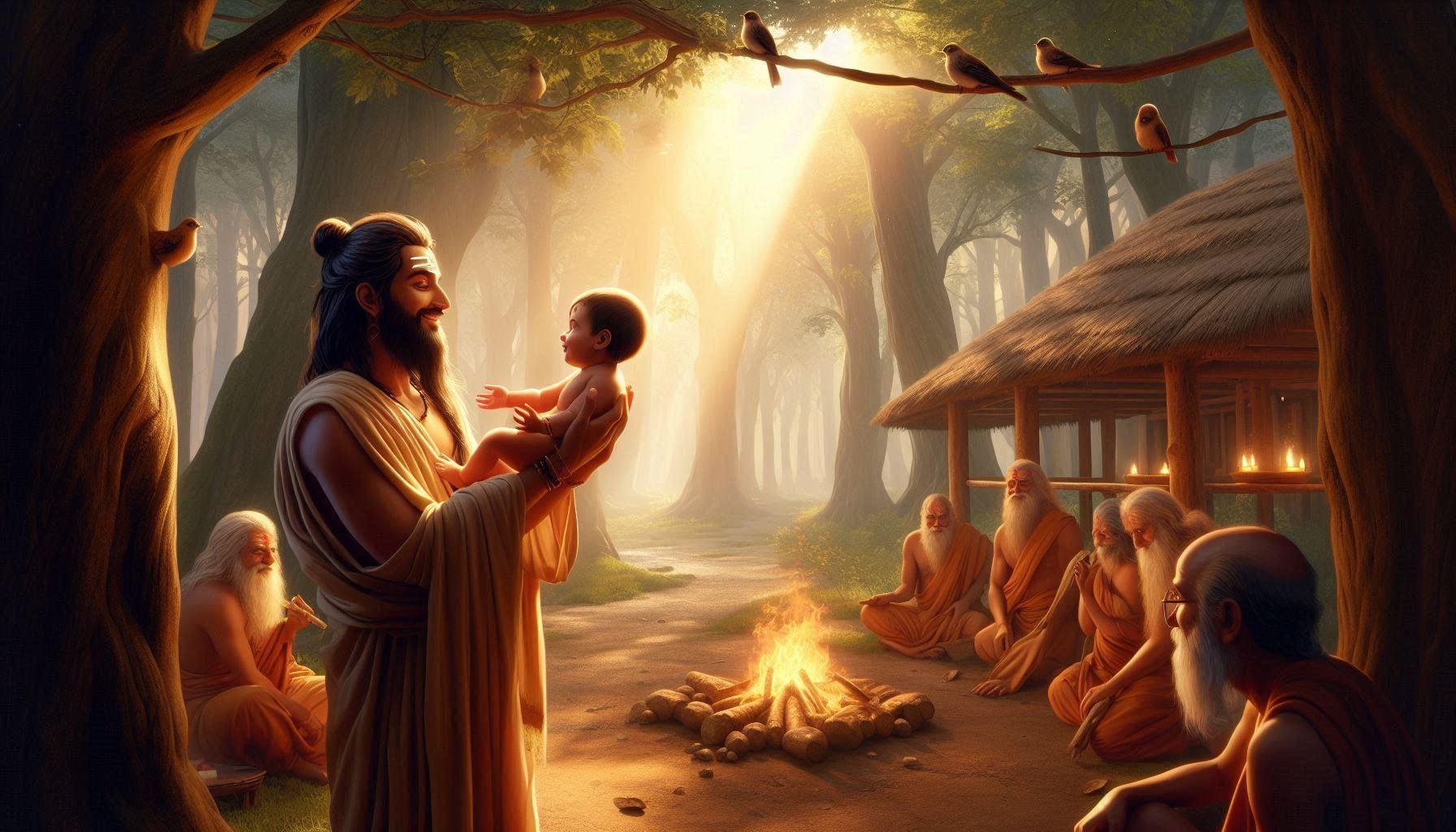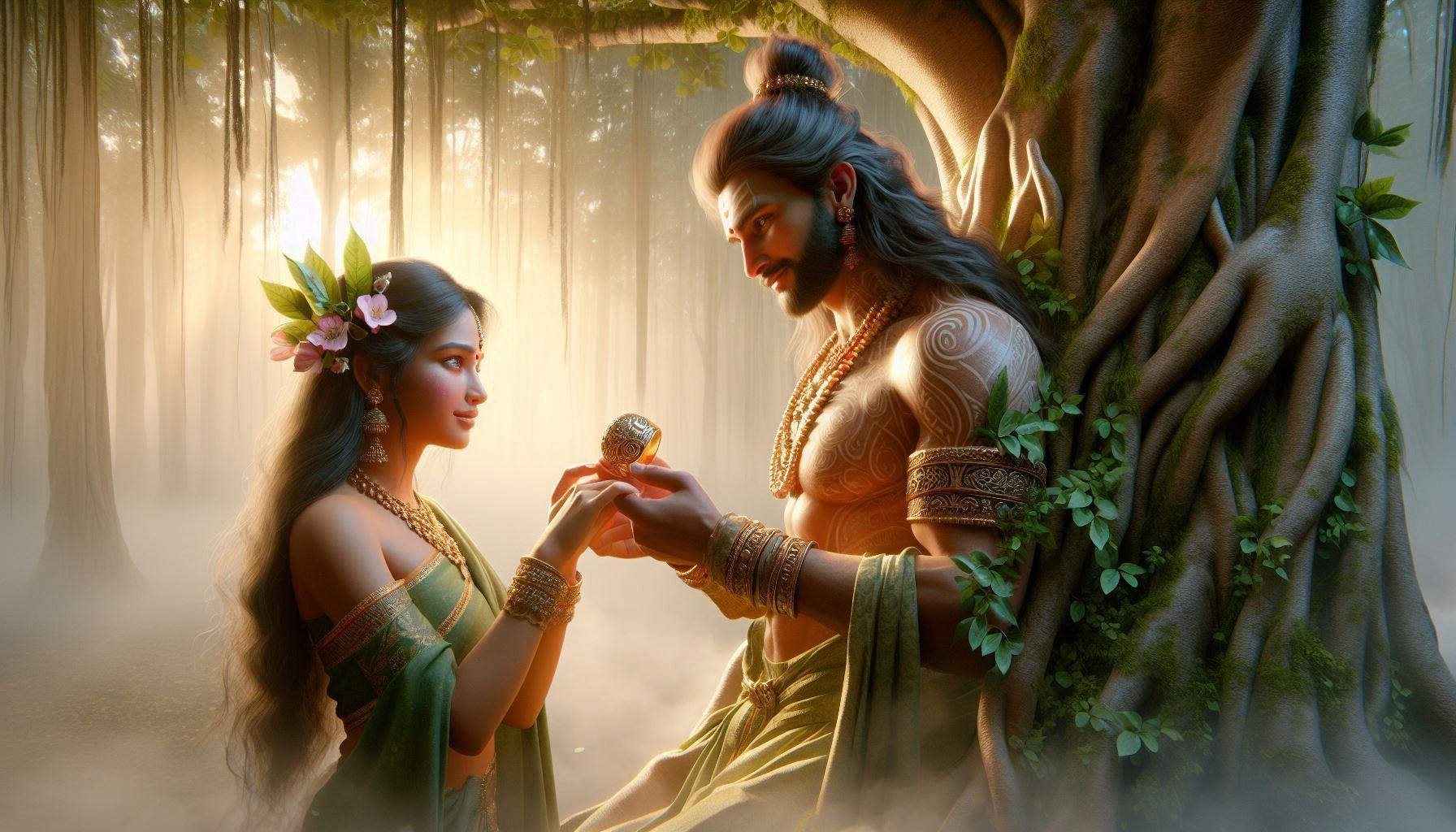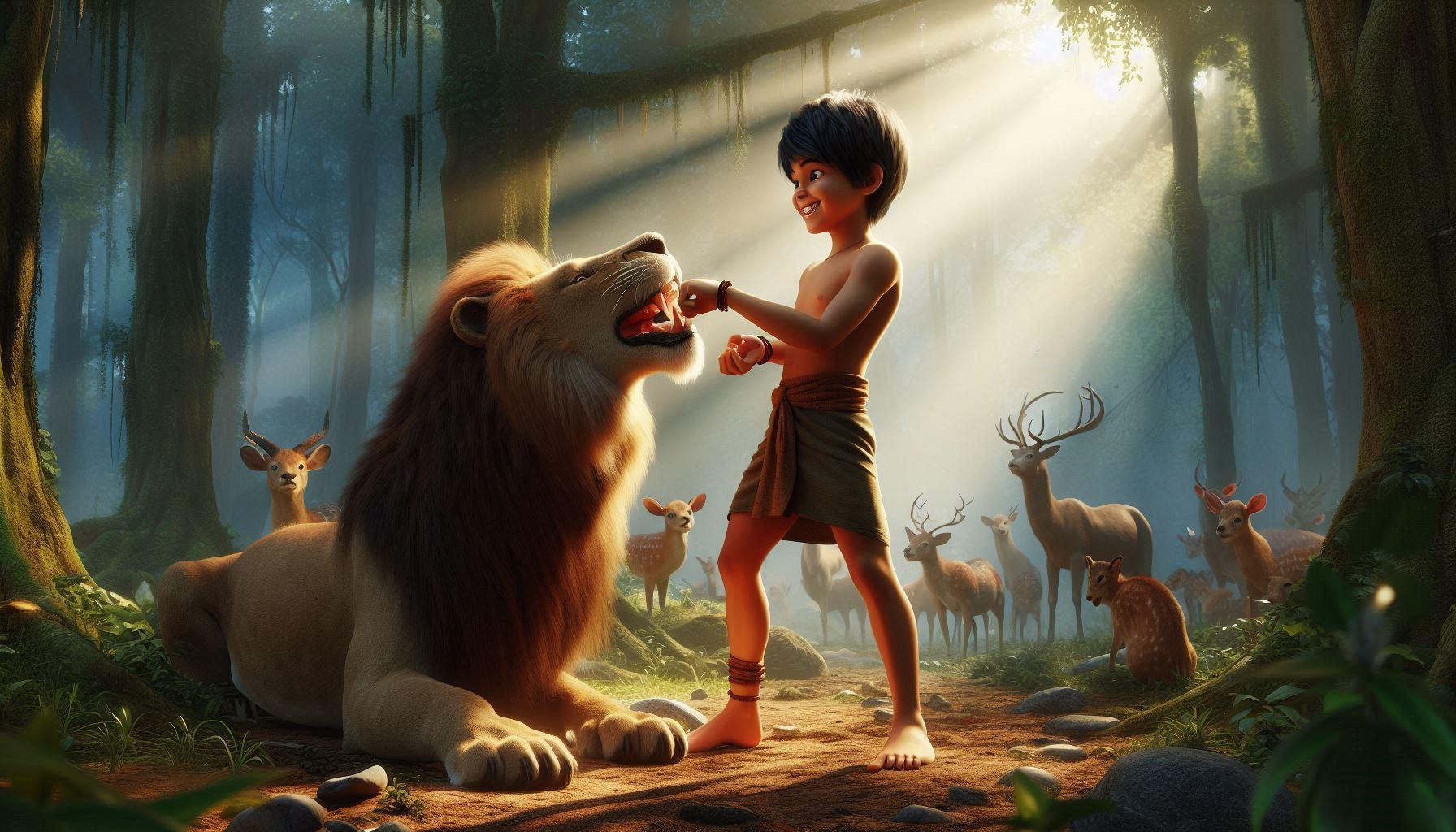In the last episode, we saw the stories of the Chandravamshi ancestors till Puru, from whom the Pandavas and kauravas descend, and his half-brother Yadu, from whom the Yadavas descended. In today’s story, Ramana Deekshitulu tells us the popular tale of Shakuntala and Dushyanta, and the birth of Bharata.
The Birth of Shakuntala.

Namaskaram, dear ones. Today, I bring you a story wrapped in forest winds and the whispers of destiny. This is the beginning of Shakuntala’s tale — a story that will one day lead us to the birth of Bharata, the very soul of this land.
Long after the time of King Puru, there lived a noble king named Vishwamitra. His other name was Kaushika, and he ruled his kingdom with courage and skill. But even with his golden crown and mighty army, something troubled his heart.
One day, as he wandered through the forests, he saw sages sitting under trees — calm, silent, and glowing with inner light. These men, though they had no kingdoms, seemed powerful in a way no king could match.
Vishwamitra thought deeply:
"What is true power? Is it the power to rule people? Or the power to conquer the mind?"
And so, a great change stirred within him. He took off his royal ornaments, left behind his palace, and walked into the forest — not for war, but for tapasya, the deep meditation and self-discipline of the sages.
He sat under trees for years, without fear, without luxury. He ate little, spoke less, and focused only on his goal — to become a Brahma Rishi, a sage so pure that even the gods respect him.
But the heavens trembled.
Indra, the king of the gods, was watching from above. He grew worried.
"If this human king becomes a Brahma Rishi," Indra thought, "his power may become greater than mine!"
And Indra — well, he had a trick up his sleeve.
He called upon Menaka, one of the most beautiful apsaras from the heavenly court. Apsaras are divine dancers — graceful, charming, and skilled in the art of enchantment.
Indra gave her a mission:
"Go to Earth. Distract Vishwamitra from his penance. Make him forget his goal."
Menaka obeyed. She descended to the forest, not with swords or spells, but with smiles, music, and beauty. Her laughter echoed like soft bells, and the flowers bloomed brighter as she passed.
Even great sages are human at heart.
Vishwamitra, who had spent years in silence and self-control, was moved by her presence. Slowly, his focus wavered. He forgot his strict vows, his fire of tapas cooled, and he gave in to her love.
For a while, the two lived together in peace. Their bond brought joy, and soon, a daughter was born — a child who was part royal, part celestial.
But the moment Vishwamitra realized what had happened — that his years of hard penance had been undone — his heart filled with sorrow and anger.
"I was so close... and I lost it all."
Without a word, he walked away, leaving Menaka and the newborn child behind.
Menaka too, though she had succeeded in her mission, felt deep sadness. Apsaras are not meant to stay on Earth forever. Their visits are short, like monsoon rain — beautiful, but passing.
With no place to go and no one to care for the baby, Menaka left the child by the riverside — the banks of River Malini — her heart heavy with both duty and grief.
But that little baby girl... her story had only just begun.
Shakuntala, The Child of the Forest.

Now listen, dear children. The winds of fate had already begun to shape a story that would echo through time.
Even the heavens cannot stay still when a human begins to rise with truth and tapasya. Indra, the king of the gods, had seen the fire in Vishwamitra’s heart. It burned not for war or riches, but for truth — for the sacred power earned only by great sages. And Indra feared that if Vishwamitra reached his goal, his own throne in heaven might shake.
So he sent Menaka, a celestial dancer, to stop him. And stop him she did — not with anger, not with weapons, but with sweetness and beauty. Vishwamitra, caught in this illusion, lost sight of his great purpose.
But truth has a strange way of returning.
One day, as the sky hung still and the birds stopped singing, Vishwamitra suddenly realized: all the strength he had gathered, all the light he had earned through his tapasya — it was now gone, like mist before the morning sun.
His sorrow turned to anger. He looked at Menaka and the child, not with love, but with pain. And without speaking a single word, he walked away — into the deep forest, back into silence.
Menaka, too, knew her time on Earth was ending. She was an apsara — a heavenly being who could not live long among mortals. Her heart ached, but she had no choice.
The father had left. The mother could not stay.
So Menaka placed her little baby — soft as moonlight — on the green banks of the River Malini. She wrapped her in silks and leaves, kissed her forehead, and whispered a prayer.
Then, with tears in her eyes, she vanished into the skies.
But fate was watching. Nature does not abandon the innocent.
A flock of gentle birds — Shakun birds — saw the baby lying alone. They circled her, chirped softly, and guarded her with their wings. They brought her fruits and protected her from snakes and wild beasts.
And then, something miraculous happened.
A great sage, Rishi Kanva, was walking through the forest. As he came near the river, he heard the cries of a baby and the flutter of wings. He stopped. And what he saw made his heart swell with wonder.
A tiny child, lying in the grass, watched over by birds — calm, safe, and glowing with a strange beauty.
Rishi Kanva gently lifted her into his arms and said,
"You were protected by the Shakun birds. You shall be called Shakuntala — the child of the birds."
He brought her to his peaceful forest ashram. There, surrounded by trees, sages, and the songs of nature, Shakuntala grew up — wise, kind, and radiant like the dawn. She tended to plants, helped the animals, and listened to the sacred chants with eyes full of wonder.
She was no ordinary girl. She was born of a great king and a heavenly dancer. But her heart belonged to the forest.
The Meeting with King Dushyanta.

One day, many years later, the silence of the forest was broken.
A royal army thundered across the land. King Dushyanta, a mighty ruler, was returning from a victorious war. His soldiers were hungry, and food was needed. The king entered the forest to hunt animals for the feast.
His arrows flew swiftly, striking down deer and boars without pause. But then, he saw a great stag — proud, strong, and beautiful. He shot an arrow that hit the animal, but the stag did not fall. It fled deep into the woods.
Dushyanta chased it, alone.
At last, he found the wounded stag — not dead, but gently resting its head on the lap of a young woman.
That woman was Shakuntala.
She was weeping softly, tending to the creature with her gentle hands. "This is my friend," she said. "He is not just an animal. He is part of our family in the ashram."
The king was stunned.
He had seen many women — queens, princesses, dancers — but none like her. Her eyes held the forest’s calm. Her voice was like water in a stream. And her kindness glowed brighter than gold.
Love rose in his heart like a full moon.
He stayed at the ashram, spoke with Sage Kanva, and shared his thoughts. The sage, wise as ever, saw the purity in both their hearts and blessed their union.
In the stillness of the forest, beneath the sky and the trees, King Dushyanta and Shakuntala were married. No drums, no palace, no crowds — only nature and truth as their witnesses.
But this was only the beginning of a story that would twist, turn, and test their hearts.
The Ring, the Curse, and the Forgotten Love.

Shakuntala and King Dushyanta were now husband and wife, though the ceremony had taken place quietly in the forest, far from palaces or drums. Before leaving, Dushyanta wanted to give her something special—something she could hold on to until he returned.
He removed the royal signet ring from his finger—the same ring that bore the royal emblem of Hastinapura—and gently slid it onto Shakuntala’s. It was far too large for her, but that didn’t matter. It was a symbol of his promise.
With a soft smile, he whispered, “I will return for you. I promise.”
But soon, the king had to go. His army waited at the edge of the forest, and the affairs of the kingdom called him back. Shakuntala watched him ride away, her heart floating between joy and longing.
Days passed. Then weeks.
Shakuntala was no longer just a girl of the forest. In her heart, she felt like a queen. She would walk alone by the river, eyes lost in the distance. She would sit under the trees, dreaming of Dushyanta’s return. Her body was in the ashram, but her soul was far away—with him.
Then one day, something unexpected happened.
A powerful sage named Durvasa came to the ashram of Rishi Kanva. Known for his quick temper and stern ways, Sage Durvasa was not someone to ignore.
He entered the ashram and called out to Shakuntala.
But she didn’t hear him.
Her eyes were open, yet they saw nothing. Her ears were listening, but only to the echo of her love. She was lost in a dream.
Durvasa’s face darkened. “How dare she ignore a sage?” he thought.
In anger, he declared, “Whoever is filling your heart right now—may he forget you forever!”
The moment those words left his mouth, the air grew heavy. Shakuntala blinked and turned—only to see the furious sage.
She fell at his feet, weeping. “Forgive me, O Maharshi! I didn’t mean to be rude—I was just lost in thought.”
The other rishis in the ashram rushed to explain, “O Durvasa, please be merciful. Shakuntala is not arrogant. She has been waiting for her husband—the king Dushyanta. She was lost in that thought alone.”
Hearing this, Durvasa’s anger began to cool. The ashram’s hospitality softened his mood.
He sighed and said, “The curse cannot be taken back. But I can ease its power.”
He added gently, “Yes, the king will forget her. But the moment he sees something that reminds him of their love—he will remember everything.”
And so the wheels of fate continued to turn. Shakuntala did not know yet that a ring was the thread on which her destiny now hung.
The Birth of Bharata, The Boy of the Forest, the Soul of a Nation.

Days turned to months. Seasons passed quietly over the trees and rivers of Rishi Kanva’s ashram. But Dushyanta did not return.
Shakuntala waited with hope in her eyes and love in her heart. But the promise of the king remained a shadow, a whisper in the wind.
Alone in the ashram, far from the royal palace, she gave birth to a beautiful baby boy.
She named him Bharata.
This was no ordinary child. He was brave, bright-eyed, and full of life—like the very spirit of the land itself. His laughter echoed through the forest. He would play with lion cubs and ride on the backs of elephants without fear. Even the wild animals seemed to know he was special.
Rishi Kanva raised him with care, teaching him the ways of dharma, strength, and truth. Bharata grew up not among golden thrones or royal comforts, but under the open sky, amidst trees, rivers, and ancient chants.
As the years passed, Kanva Muni saw the strength and greatness budding within the child. One day, he gently said to Shakuntala, “My daughter, your son is the son of a king. It is not right that he grows up unaware of his lineage. Dushyanta must be reminded of his promise, and Bharata must be seen by his father.”
Shakuntala nodded silently. Somewhere deep inside, a small flame of hope still flickered. Maybe... the king would remember.
So one morning, with little Bharata holding her hand, she set out toward the capital.
They came to a wide river that lay in their path. A boatman agreed to take them across. As the boat gently rocked on the water, Shakuntala sat silently, gazing at the sky.
She reached out to touch the cool river water, letting it flow between her fingers. For a moment, she closed her eyes, remembering Dushyanta—his eyes, his voice, the ring he had placed on her hand.
And in that moment, silently, unnoticed, the ring slipped off her finger... and fell into the river.
She did not see it. She did not hear it. But fate had just taken another turn.
That ring—small and simple—was the only proof that tied her to the king, the only thread that could break the curse and awaken Dushyanta’s memory.
But now it was gone—lost in the waters, swallowed by the river.
Still, Shakuntala journeyed on, unaware that her greatest trial was yet to come...
🦁 Bharata, Son of the Forest, Heir of the Throne.

Bharata was no ordinary child.
He ran barefoot with deer and played atop mighty elephants. He roared back at lions, not with fear, but with joy. The forest was not just his home—it was his kingdom. The trees were his palace, the rivers his companions, and the wind his messenger.
Shakuntala, though once heartbroken, now found peace in watching her son grow into a radiant soul—strong, fearless, and noble in heart. Yet, the shadow of the past still lived in her eyes.
Years earlier, when she had arrived at the royal palace, holding little Bharata’s hand, her heart was full of love and hope. But what she met was disbelief and rejection.
King Dushyanta, cursed by forgetfulness, stared at her with stern eyes and asked, “Who are you?”
Shakuntala’s voice trembled as she replied, “I am your wife… Shakuntala. And this is your son, Bharata.”
But Dushyanta frowned, his heart clouded. “How dare you claim such a thing?” he thundered. “What proof do you have?”
The courtiers gasped. The queen who had come with nothing but love was now turned away. Shakuntala stood still, not knowing how this could be. “He loved me… how can he forget me so completely?” she whispered to herself.
Her heart, broken once again, led her back to the forests.
But this time, she did not cry. She embraced her life as it was. She gave Bharata the best of teachings, both human and divine. They lived quietly, deeper in the woods, away from courts and crowns.
Time passed.
One day, King Dushyanta was out hunting in the forest. As he wandered, he saw a young boy—strong like a lion, graceful like a deer—fearlessly opening the mouths of full-grown lions and counting their teeth, playing with wild creatures as though they were kittens.
The king was stunned.
“Who is this child?” he wondered. “Is he a deva, a god? A forest spirit? A child of magic?”
He stepped forward and asked the boy, “Who are you, dear one? From which world do you come?”
The boy looked up, smiled boldly, and said, “I am Bharata, son of King Dushyanta.”
Dushyanta’s heart stopped for a moment. “Your father’s name is… Dushyanta?”
“Yes,” said the boy proudly. “He is a great king. My mother is Shakuntala.”
At that very moment, something stirred in Dushyanta’s mind. A forgotten scent… a soft voice… a face in the mist of memory. And then it struck him—the curse was lifting.
The river had returned his lost ring just days earlier. When a fisherman found it in the belly of a fish and brought it to the palace, Dushyanta’s memories began flooding back.
Now, standing in front of this brave boy, everything returned—Shakuntala, the forest, the love, the ring, the vow.
Kanva Rishi arrived then, with quiet dignity, and gently narrated the entire tale. Dushyanta stood in silence, eyes wet with remorse.
He bowed before his son, embraced him, and sought forgiveness from Shakuntala, who had endured so much in silence.
With honor and joy, the king took Shakuntala and Bharata back to the palace.
Bharata, raised by rivers and winds, became the emperor of a vast land. He ruled not with just a sword, but with the strength of dharma.
He united the people with love, justice, and wisdom.
And it is after him, dear children, that this land was named— Bharat. Bharatvarsha. The land of Bharata, the son of love and courage.
To Be Continued...








